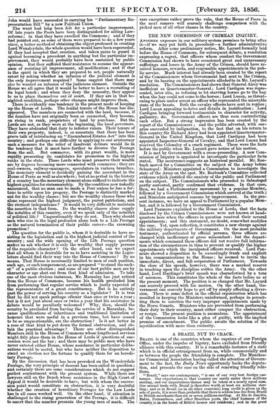THE NEW COMMTSSION OF CRIMEAN INQUIRY.
ANOTHER exposure in our military systempromises to bring after it—if we may put faith in precedent—a further administrative reform. After some preliminary notice, Mr. Layard formally laid before the House of Commons, for subsequent debate, a resolution expressing a regret, that officers whose conduct the Government Commission had shown to have occasioned great and unnecessary sufferings and losses in the Army of the Crimea, should have re- ceived honours, rewards, and responsible appointments in the pub- lic service. Much interest had already been created by the report, of the Commissioners whom Government had sent to the Crimea, and by its bearing on the appointments allucledto in Mr. Layard's resolution. The Commissioners had shown that. General Airey was inefficient as Quartermaster-General ; Lord Cardigan was repre- sented, inter alia, as refusing to let starving horses go to the hay when the hay could not come to the horses ; Lord Luean, as threat- ening to plate under arrest an officer who represented the miserable state of the beasts. Both the cavalry officers have sent in replies; Lord Lucan appealing to dates and details in justification ; Lord Cardigan bringing forward. testimonials to character for activity, gallantry, &c. Government officers are thus seen contradicting each other. But a strong impression has been created by the report of the Commissioners ; and the public adverted, with sur- prise succeeded by indignation, to the fact that on his return to this country Sir Richard Airey had been appointed Quartermaster- General in the United Kingdom, that Lord Cardigan had been appointed Inspector-General of Cavalry, and that Lord Lucan had received the Colonelcy of a crack regiment. These were the facer before the public when Mr. Layard gave notice of his motion. It is met by Government with a cross-proceeding. A new Com- mission of Inquiry is appointed to investigate the particular facts stated. The occurrence suggests an historical parallel. Mr. Roe- buck moved for a Committee on the subject of the Army before Sebastopol : Ministers appointed a Commission to investigate the state of the Army on the spot. Mr. Roebuck's Committee collected evidence which justified the anxiety of the public and Parliament on the subject. The Commissioners who proceeded to Sebastopol partly corrected, partly confirmed that evidence. In that case,. then, we had. a Parliamentary movement by a popular Member, followed by a Government Commission which arrived at the truth; and Ministers anticipated censure by improvement In the pre- sent instance, we have an appeal to Parliament by &Topple' Mem- ber, and it is followed by a Government Commission.
Lord Panmure explained to the House of Lords, that the facts disclosed by the Crimea Commissioners were not inown at head- quarters here when the officers in. question received their several appointments.; and this statement, no doubt, somewhat modifies the ease. Yet, upon reflection, it constitutes a new charge against the military departments of Government. On the most probable testimony, authenticated by official persons, three officers are charged with inefficiency or gross misconduct : but the depart- ments which command these officers did not receive full informa- tion of the circumstances in time to prevent or qualify the higher appointments which the inculpated officers received. Lord Pan- inure showed a disposition to be exceedingly frank and explicit in his communications to the House ; he seemed to invite the immediate, direct, and full cooperation of Parliament. Towards the close of his speech, however, there was a marked reserve in touching upon the discipline within the Army. On the other hand, Lord Hardinge's brief speech was characterized by a tone of soreness. This constitutes the whole of the facts before us at the present moment. The position is so changed that Mr. Layard can scarcely proceed with his motion. On the ether hand, Go- vernment can scarcely hope to get of by simply effecting a diver- sion. There is some defect in the off al organization which has resulted in keeping the Ministers uninformed, perhaps in permit- ting them to sanction the very improper appointments made by the Horse Guards. Ministers who are prevented from performing their duty to their country, must either conquer the obstruction, or resign. The present position is anomalous. The appointment of the Commission looks like a plea of guilty, with the implied promise of amendment. The public awaits the solution of the mystification with more than curiosity.


























 Previous page
Previous page